Living among ruins: The hidden side of Lisbon’s housing crisis
The Portuguese photographer Mário Cruz, a two-time World Press Photo winner, reveals the drama of people without resources or access to decent housing. His book ‘Roof’ was recently presented at the Rencontres d’Arles festival in France
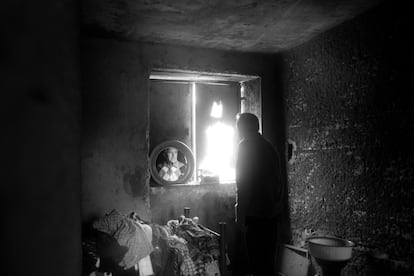
From the windows of António Lemos’ home you can see the tops of some of the trees around Belém Palace, the official residence in Lisbon of the President of the Republic of Portugal, Marcelo Rebelo de Sousa. António’s windows are in fact holes through which the sun, rain and wind come through. He sleeps on a mattress on the floor and covers himself with a quilt that is too flimsy to protect him and his stuffed animals from the early morning winter cold. António Lemos is 79 years old and once worked as a kitchen assistant in popular restaurants and hotels in Lisbon. He fought for two years in the colonial war in Guinea-Bissau, the worst of the three simultaneous wars that Portugal fought in Africa between 1961 and 1974. He receives a monthly pension of €525 ($568). For having fought on behalf of his country, he gets another €175 ($189).
-A month?
António laughs and clarifies that the latter is an annual amount.
For three years he has lived in a dilapidated old house that lacks a door, electricity, water or gas. António uses candles for light and cleans up in a public bathroom. Five brightly colored ties hang from two hangers. “Sometimes I wear one. I never gave up taking care of my appearance, you just can’t give up on hygiene. If you do, the path to disaster is faster,” he explains. In the room where he speaks there is a dirty sofa with clothes piled up on it, a table with a candelabra, a small radio transistor and a fork, as well as a shelf with a religious book, napkins, facemasks and spare candles.
One Thursday last spring he went to Avenida da Liberdade (Liberty Avenue) to celebrate, along with more than 200,000 people, the defeat of the dictatorship half a century ago. António celebrated despite the fact that he has every reason to feel abandoned by democracy, which he greeted with enthusiasm on April 25, 1974.
In the midst of the euphoria of their poetic revolution, the Portuguese believed that any utopia was possible. Freedom has arrived, but other dreams, such as the right to housing, have become nightmares for low-income people like António. Unable to pay rent with his meager pension, the former combatant settled in this abandoned house that he shares with cats and waste. Months ago he gave up looking for a decent roof and resigned himself to waiting for an accommodation offer from some institution.
This pensioner is one of the protagonists of Roof, the latest project by Mário Cruz, 36, a two-time winner of the World Press Photo for his work in the Philippines and Senegal. It is a book-object that was presented at this year’s Rencontres d’Arles festival in the southern French city. For a decade, the photographer has scoured his home city to make visible what nobody sees: inhospitable and unhealthy places converted into forced abodes for those who cannot afford a conventional roof over their heads. “I started in 2013, when many people lost their homes during the Troika crisis,” he says, alluding to the bailout and subsequent austerity measures imposed by the “troika” of the International Monetary Fund, European Commission and European Central Bank. In those years almost no one was ashamed of living in derelict buildings. “They would ask me to show where they lived, so that people would know. But when I returned in 2019, the attitude had changed and people now prefer not to be identified because they are ashamed of their situation. The housing crisis did not begin now, it is structural,” underscores the photojournalist.
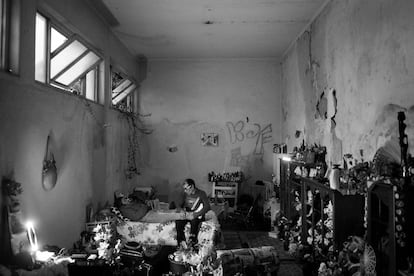
Lisbon has been in style for a few years: it attracts foreign investors, digital nomads, rich retirees fleeing the cold and millions of tourists. In 2023 it was declared the best urban destination in Europe at the World Travel Awards. The city is dying of success and gentrifying wildly. It is a cocktail that puts pressure on the real estate market. Portugal ranks fourth in the European Union’s list of member states where house prices have increased the most since 2015. It is a crisis that has been going on for a long time and that will take time to resolve, according to Carlos Moedas, the mayor of Lisbon since 2021. “Until now there had never been a government that had invested so much in housing, €560 million. There are 1,000 families that receive help to pay rent and, in addition, every 15 days I give 30 keys to subsidized housing to people who cannot pay anything or have low salaries, such as police officers, teachers and nurses. It had not happened in the previous 10 years, but solving this will take a long time.”
On a list of 24 European cities, Lisbon is the third most expensive one: at the end of last year, the rental price per square meter was €20.80, above Madrid (€17.90) in neighboring Spain. This is not within the reach of a Portuguese worker who earns the average salary: €1,505 ($1,629) in 2023.
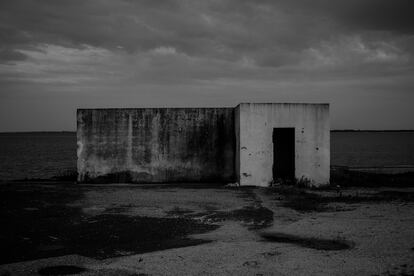
That tourist paradise is not the country that emerges in Roof, an exercise in visual poetry that is ultimately a reckoning with one of the great undelivered promises of democracy. “Everyone shall possess the right for themselves and their family to have an adequately sized dwelling that provides them with hygienic and comfortable conditions and preserves personal and family privacy,” says Article 65 of the Portuguese Constitution. “What I have seen is a crumb of reality. It is easier to fall into a situation like this than to have a great life, just by not having any savings or not having your rental contract renewed. It is not acceptable that, in a democratic country, if you have a job or have worked all your life, you do not have the right to decent housing,” stresses Cruz.
None of these promises have panned out for the municipal gardener who has built a home inside shipping containers. With a monthly salary of €800 ($865), he cannot find an affordable apartment. “Lately I haven’t been looking for accommodation anymore, and I’m trying to save money for later, but €800 are not enough for rent, food and bills,” he says. He still resides in the neighborhood where he was born 55 years ago, but has moved from the family apartment where he grew up to the maritime cargo container located opposite. The gardener now lives in the company of a cat and numerous birds that occupy a dozen cages. “Animals give me peace of mind, I feel like they are my family.” He gets electricity thanks to an agreement with a neighbor, and hopes to one day move to the countryside where he can have all the animals he wants and cultivate his garden.
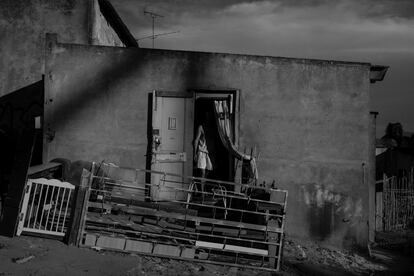
In addition to the artist’s book, Cruz presented Roof as an exhibition in Lisbon, inside an empty and deteriorated building in the heart of the city surrounded by tourist apartments and stratospherically priced homes. The Antigo Recolhimento das Merceeiras was founded to accommodate people of “shameful poverty” and later housed apartments that became empty decades ago. It belongs to the Santa Casa da Misericórdia, a charitable institution founded six centuries ago with a gigantic real estate portfolio. The setting is perfect to host photographs of the shameful poverty of the 21st century: workers and retirees with ridiculous incomes for the current demands of the real estate market. “These people do not enter the statistics because they are not on the streets, although they do not have a home either, they are invisible,” says Cruz, who excluded the homeless or people with addiction problems from his work.
In times of immediacy, he embraced a cause that required patience and delicacy to detect the inhospitable places where someone was struggling to build a room of their own. He observed the city, paying attention to certain subtle signs: clothes hung out to dry next to an abandoned building, a new padlock on a flimsy door, a wooden board on the opening of a window...
He found young mothers with babies, construction workers with job insecurity, couples with precarious employment and retired folks. They were dwelling among gigantic cracks, encroaching ivy and crumbling roofs. “They are fragile people and they go to live in very fragile places. However, they try to turn it into a home: almost everyone has a mat at the entrance, a table with a tablecloth, a painting hanging on the wall, and they leave the umbrella at the door even if it is raining heavily inside,” he notes.
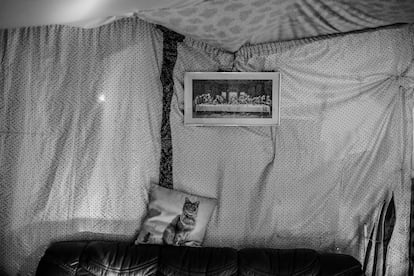
Many of them cling to religious faith, like António Lemos, who goes to mass every Sunday and has distributed dozens of pictures of saints and the Virgin Mary in every room. He fulfills what he considers his duties, including going to vote in the elections. It is his way of not giving in to despair, just as he tidies himself neatly and hides his circumstances from his daughter, who has emigrated to France. “I lie to her so she won’t know how I live,” he confides.
Nor do the friends who invite him to lunch from time to time know that he lost his last decent home when Chinese investors bought the property. Now he receives his correspondence at his sister’s house; she is equally oblivious to his situation. The former combatant who once faced a war is now paralyzed by modesty. “My sister doesn’t know either. I don’t hide it on a whim, I do it for many reasons. Perhaps shame is one of them, although what should I be ashamed of? I’m not hurting anyone, I am an educated person who can go out with my head held high.”
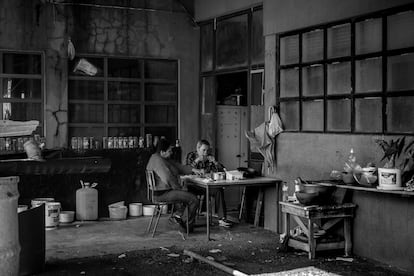
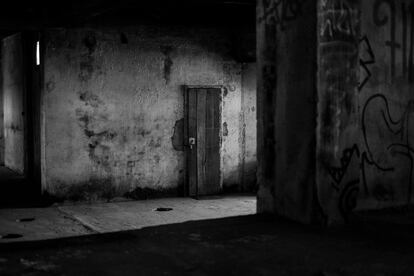
Sign up for our weekly newsletter to get more English-language news coverage from EL PAÍS USA Edition
Tu suscripción se está usando en otro dispositivo
¿Quieres añadir otro usuario a tu suscripción?
Si continúas leyendo en este dispositivo, no se podrá leer en el otro.
FlechaTu suscripción se está usando en otro dispositivo y solo puedes acceder a EL PAÍS desde un dispositivo a la vez.
Si quieres compartir tu cuenta, cambia tu suscripción a la modalidad Premium, así podrás añadir otro usuario. Cada uno accederá con su propia cuenta de email, lo que os permitirá personalizar vuestra experiencia en EL PAÍS.
¿Tienes una suscripción de empresa? Accede aquí para contratar más cuentas.
En el caso de no saber quién está usando tu cuenta, te recomendamos cambiar tu contraseña aquí.
Si decides continuar compartiendo tu cuenta, este mensaje se mostrará en tu dispositivo y en el de la otra persona que está usando tu cuenta de forma indefinida, afectando a tu experiencia de lectura. Puedes consultar aquí los términos y condiciones de la suscripción digital.









































